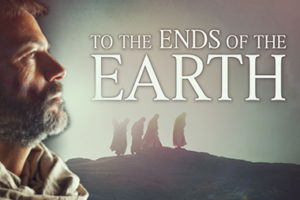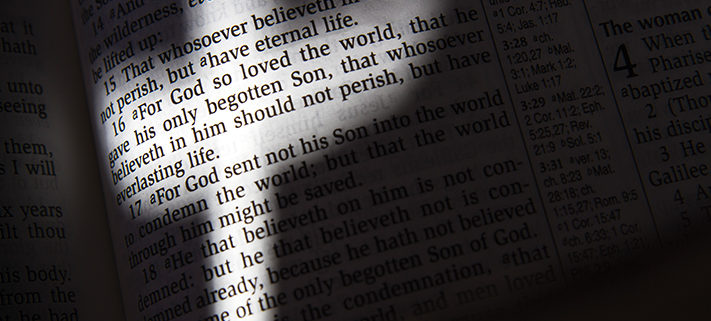Preach The Word – Resurrection Apologetics
Apologetics in Preaching
Resurrection Apologetics
I have to admit, to my great shame, that I had trouble preaching during the Easter season. Easter Sunday was great. Preaching on Doubting Thomas the next Sunday was always a delight, but the rest of the season was tough for me. What’s left to say? One bit of advice that helped me was: read the hymns of the Easter season; they will inspire you. And they did. Another inspiration came when I got more serious about apologetics. The Sundays of Easter became an opportunity to speak about the facts of the resurrection and how those facts were the foundation for a confident faith in the face of all tragedy, especially death.
A theme of sorts emerged in my Easter season preaching, one taken from 1 Thessalonians: “Brothers, we do not want you to be ignorant about those who fall asleep, or to grieve like the rest of men, who have no hope” (1 Th 4:13). I wanted to make sure that my people knew where they were going, where their faithful loved ones who died already were, and the basis for this hope. In short, I wanted them to know the facts, reason, and hope of the resurrection of Christ.
On Easter Sunday, when visitors abound, I also wanted the skeptics to know. I didn’t want them to be ignorant either. But as we have already discussed in this series of articles, the skeptic might balk at a sheer proclamation of these facts. Again, preaching is the means by which the Spirit will grant faith but the apologetic minded preacher is also aware of the task to knock down any barriers. So the skeptic might contest, “How do you know?” and the answer “Because the Bible said so” is incredulous to him. It is a form of circular logic.
The skeptic is aware of the following circular argument: Question: How do you know that the Bible is true? Answer: Because it is God’s Word. Question: How do you know that it is God’s Word? Answer: Because the Bible says it is God’s Word. Question: Why should I trust the Bible? Answer: Because it is God’s Word. While this is true, the unbeliever is right to be skeptical. Insert Koran for Bible, and you see the problem.
So how do we get out of this circular argument? The answer is the resurrection of Christ. Question: How do you know that the Bible is true? Answer: Because Jesus said so. Question: Why should I trust Jesus? Answer: Because he rose from the dead, and I’m going with the guy who claimed to be true God and backed it up with a resurrection.
Facts back up the claims of Christianity.
The advantage of this tactic is that the argument is moved from the arena of blind faith to one of normal reason. Thus the skeptic is not left with only a command, “Believe this because I say that it is true” but is offered evidence for the claim. Why should the skeptic believe you and not the Muslim who says that Jesus did not rise from the dead (or even die on the cross)? In this case the apologist simply levels the playing field while being fully aware that the Spirit, and only the Spirit, will convert the unbelieving heart. The apologist only wants to show that Christianity is not like other religions that only assert claims. Facts back up the claims of Christianity.
It is helpful then to start with the facticity of the resurrection of Christ. Is there good reason for the skeptic to believe that at least the resurrection of Christ is possible? I think so, especially if the skeptic is willing to treat the evidence of the resurrection as they would any historical claim from the same era. Permit me to lay out the evidential argument for the resurrection of Christ in outline form:
I. There are eyewitness accounts of Jesus’ crucifixion.
A. The Romans knew how to crucify someone to death, and there is no good reason to believe that they did not kill Jesus, especially considering the punishment Roman soldiers faced for not carrying out their duties.
B. There is no good reason to doubt the eyewitness accounts of the crucifixion.
II. There are eyewitness accounts of Jesus’ resurrection. There is no good reason to believe that these eyewitnesses lied about what they experienced.
A. They gained nothing from such a ruse (money, power, prestige).
B. They were willing to die for this truth, making them very credible eyewitnesses.
C. There is no good reason to believe that these eyewitnesses were all mentally insane. How could so many people in one place and in one time all of a sudden be insane when there was no evidence of a preexistent mental illness? And even if this was the case, how credible is it that so many mentally insane people got their stories straight?
III. Only three groups had access to the body of Christ: the Romans, the Jewish enemies of Christ, and the disciples of Christ. There is no good reason any of these groups would fake the resurrection of Christ.
A. The Romans would not fake the resurrection. They were the ones who crucified him.
B. The Jewish enemies of Christ were the ones who wanted him dead in the first place. They were even paranoid about a theft of the body and demanded that the Roman authorities secure the grave.
C. Despite the paranoia of the Jewish leaders, there is no good reason to believe that the disciples of Christ would fake his resurrection. Most of them displayed incredulity to his claims of a death and resurrection. Nor would they have gained anything from such a conspiracy except persecution.
IV. Jesus claimed to be true God.
A. There is no evidence or reason that Jesus would lie about this.
1. Jesus did not gain anything from such a lie except death.
2. There is no evidence that Jesus was crazy.
B. Jesus proved his divinity by rising from the dead and performing miracles for which there were credible eyewitness accounts.
V. Jesus declared the Bible to be the inerrant Word of God.
A. Jesus declared the Old Testament to be the Word of God.
B. Jesus sent the Spirit to inspire the New Testament writers.
VI. Since Jesus is divine we ought to believe what he says about the inerrancy of the Bible.
Theories of a faked resurrection are outlandish and easily dismissed.
This is only a brief outline. The Christian must contend with textual criticism and questions of the canon, topics the confessional Lutheran pastor is trained to handle. The apologist must also deal with theories of a faked resurrection, but they are outlandish and easily dismissed. But there are also other tidbits that enhance the resurrection argument such as women discovering the empty tomb. If you were to create a believable story about a resurrection in an era when female witnesses were deemed less credible than male witnesses, you would not make women the first eyewitnesses in your story.
Armed with this logical outline, the preacher can move to the deep meaning of the resurrection: We too will rise! Three elements combine to make Easter season preaching robust: the facts of the resurrection, the breaking of the circular logic mentioned above, and a passionate application to frail human life.
The Third Sunday of Easter (Year C, May 5, 2018) connects the resurrection of Jesus Christ to our place in heaven. In the Gospel (Jn 21:1-14), Jesus proves his resurrection by appearing to the disciples on the shores of Galilee. In the First Reading, Christ converts Saul to be the great missionary to the Gentiles so that we might know with certainty that Jesus actually rose from the dead (Ac 9:1-19a). The Second Reading is a picture of heavenly worship from Christ’s Revelation to St. John (Rv 5:11-14). The Lamb is on his throne encircled by the living creatures and the elders. They sing with a multitude of angels “Worthy is the Lamb.” This is our home made secure by the resurrection of Christ. All people will know and all people will fear this awe-inspiring God because of his victory over death, a fact we sing in the Psalm (67). The following is an example of how a preacher might make these connections for his listeners.
You can’t just assert things and expect people to believe them to be true. We are far too jaded to accept the assertions of the late night television salesman. True, we all have our gullible moments. The infomercials still run, don’t they? We sooo want to believe that eggs won’t ever stick on this new kind of skillet. Yet we learn from our mistakes and become less and less naïve as we grow older. That’s probably a good thing.
In the marketplace of spiritual ideas there are a lot of infomercials. This preacher over here claims he can cure diseases. That preacher over there can give you “your best life now.” One religion promises enlightenment, another internal peace. This denomination stresses moral integrity, that one social justice. It even seems that some people chose their spirituality by letting the charisma of the leader trump facts, a dangerous method. So who are we supposed to believe let alone follow with our whole lives? All religions make assertions, but how do we know which one, if any, is true?
Sometimes we investigate claims by trial and error. We buy the skillet and hope it lives up to the salesman’s pitch. As we grow a little wiser we might carry out some research. What are the reviews of the skillet? If the reviews are poor, we don’t waste our money. But we can’t do that with religious claims, can we? We can’t go by trial and error. A religious commitment means exactly that, a commitment. You can’t go half way. And what religion is not going to have glowing reviews from its adherents and bad reviews from its enemies? We aren’t buying kitchenware after all; we are trying to find a way of life, a way of thinking, a path to truth. We need something more.
We can test the claims of Christianity not by Yelp reviews or by trial and error, but by careful investigation of its claims.
But not all is lost. We can test the claims of a religion. In particular we can test the claims of Christianity not by Yelp reviews or by trial and error, but by careful investigation of its claims. Is Jesus who he says he is? This was certainly a question with which the disciples grappled. You don’t think the disciples doubted Christ? Last week we heard about Thomas forever known as “Doubting.” Peter and the rest could not wrap their heads around the death and resurrection of Christ. They heard but did not always confidently believe. We are not alone in our doubts.
It would take a lot for us to accept a bodily resurrection of someone whose funeral we just attended.
Jesus appeared to his disciples in order to prove his resurrection. And notice how he often did it. He ate! It’s so simple. He ate with the Emmaus two and he ate breakfast on the shore of the Sea of Galilee as we heard today. Think about it. Let’s say that you just attended a funeral. Maybe it was your grandmother. Now let’s say you see grandma a week later. Your probably would rub your eyes or pinch yourself. It must be a dream. “I shouldn’t have eaten that frozen pizza at midnight last night.” Or maybe you might think this is a hallucination. “The doctor did change the dosage of my medication last week.” It would take a lot for us to accept a bodily resurrection of someone whose funeral we just attended. I wonder if some of the followers of Christ thought along the same lines. Thomas did for sure. The Emmaus disciples weren’t fully convinced either.
Now let’s say that your dead relative eats with you, physically eats in front of you. There is a piece of fish on a plate and then the piece of fish is gone. Now that’s something. This is exactly what Jesus did for the disciples in Galilee. Peter believed right away and maybe his fellow fishermen-disciples did too. But Jesus goes above and beyond. He provides physical proof. He eats. Ghosts don’t eat. Hallucinations don’t eat. Jesus bodily rose from the dead. Peter wouldn’t wonder a week late, “Did I really see Jesus?” He would remember: the fish was there and then it wasn’t.
Now, you might say, “That’s nice, but I wasn’t there.” True enough. You weren’t there when Abraham Lincoln gave his Gettysburg address either, but you believe it happened. Why? Because there are credible eyewitness accounts. You have no reason not to believe it. In fact, if you denied it, you would be thought of as a weird conspiracy theorist. Granted, the resurrection of Christ happened way before the Civil War. And it is more than a presidential speech; it is a supernatural event. Yet, we have eyewitness accounts and documents to back up the resurrection claim. We have more textual evidence of Christ’s life, death, and resurrection than any other event of that era, and other events aren’t even close. We have more historical evidence that Jesus rose from the dead than any Roman emperor winning any war or legislating any law.
So we are left with conspiracy theories raised against the resurrection claim. Maybe this was faked by the disciples? But let’s think it through. Why would they do that? Generally speaking, people lie for three reasons: money, sex, or power. The disciples gained no prestige, no revenge, no high placement in society. They gained no power. Nor did they become wealthy or more popular with the ladies. In fact, they received only persecution and, for most of them, death. Would the Roman officials fake Christ’s resurrection? Why would they? They wanted to be done with this religious squabble. Would the Jewish leaders? They were the ones who wanted him dead in the first place. We are running out of options. Except one. He actually rose from the dead.
And God wants you to know about it. So Christ sent the Spirit to inspire these eyewitnesses and historical investigators like St. Luke to write about it. These documents have been carefully vetted and preserved for you. In one case, Christ took his own enemy, Saul, kicking and screaming into the faith. We heard about it today. He literally knocked Saul down on the road to Damascus and confronted him. He baptized Saul, known to us as Paul, and converted him to Christianity. He even taught Paul in Arabia everything he needed to know so that he could testify to the leaders in Palestine, to Jews and Gentiles across the Mediterranean world, and finally to us centuries later through his letters. And his message is this: Christ died for sinners like you and me, and he rose from the dead defeating death for us.
These eyewitness documents are to be preached to desperate sinners who face the possibility of death every day.
I know that we are pretty jaded people. It comes with the territory. How many products have you bought that have left you wanting? How many lemons have you driven off the used car lot? And it’s actually worse than just being jaded. We have sinful minds which by nature abhor God and his message of grace. We (our sinful sides) fight against him. So did Thomas, Peter, and Paul. So these eyewitness documents are not just for our careful investigation. They are to be preached. Preached to desperate sinners like you and me who face the possibility of death every day. Preached so that we might believe that Jesus truly is who he says he is, the Lord Almighty and our Savior from sin.
“I don’t want you to be ignorant … or grieve like the rest of mankind” (1 Th 4:13) to quote that same St. Paul. I want you to know that there is a real hope based in real facts. I don’t want you to wonder what happens next. I don’t want you to be alone in the misery of burying a loved one. I don’t want you to be depressed about death or fear what comes next. I want you to be at peace. I want you to know that God did something about this horrible thing called death. I want you to know that Christ loved this world so much so that he gave his life for it, to pay the price for your indiscretions and everybody else’s too. I want you to know that he overcame death with a miracle. I want you to know that he promises you the same miracle of resurrection. I want you to know that Jesus Christ rose from the dead, and he did it for you…so that one day you and I could join in heaven’s song we heard today, “Worthy is the Lamb, who was slain, to receive power and wealth and wisdom and strength and honor and glory and praise!” (Rv 5:12). I want you to know, and so did Christ. So he ate with the disciples and told them to tell us. Christ lives, and so shall we.
Written by Michael Berg
Some helpful online resources:
Cross Examined (crossexamined.org)
Gary Habermas (garyhabermas.com)
Ravi Zacharias International Ministries (rzim.org)
Reasonable Faith (reasonablefaith.org)
Stand to Reason (str.org)
The Veritas Forum (veritas.org)
Thinking Fellows (thinkingfellows.com)
Library of Historical Apologetics (historicalapologetics.org)
WORSHIP
Learn about how WELS is assisting congregations by encouraging worship that glorifies God and proclaims Christ’s love.
GIVE A GIFT
WELS Commission on Worship provides resources for individuals and families nationwide. Consider supporting these ministries with your prayers and gifts.
[fbcomments num=”5″]




 C18 is a national outreach program with a goal to connect with 1 million unchurched people. Advent planning resources for C18 are available at
C18 is a national outreach program with a goal to connect with 1 million unchurched people. Advent planning resources for C18 are available at 















